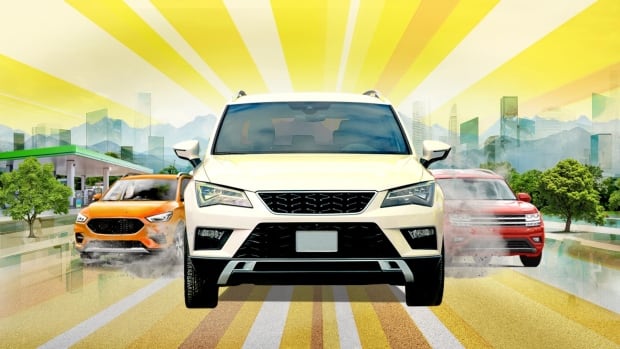Last August, Paul Marriott emailed CBC’s What on Earth? newsletter to share his frustration buying a vehicle. In looking to replace his 2006 Toyota Matrix, a compact hatchback, the Ontario resident had detected a pattern.
“It is impossible to buy a new small car,” he wrote. “Gone are the Honda Fit, the Toyota Yaris, GM Spark, Nissan Versa, Ford Fiesta, etc. Apparently, people only want SUVs.”
Marriott was largely right. Despite the higher price tag, SUV and truck sales have grown exponentially in North America in recent decades, eclipsing sedans in the process. According to DesRosiers Automotive Consultants, 86 per cent of all vehicles sold in Canada in May were classified as SUVs or pickup trucks. And Europe and Asia have developed a greater taste for them, too.
But the ubiquity of SUVs and trucks isn’t an accurate reflection of what people want to drive, say industry analysts.
The trend has been greatly influenced by a combination of savvy marketing, government regulations that incentivize bigger vehicles and limited supply of more modest ones.
Indeed, much of it is driven by one simple economic fact.
“Smaller cars are less profitable,” said Stephanie Brinley, associate director at U.S.-based transportation consultancy S&P Global Mobility.
In recent years, auto manufacturers have phased out many smaller vehicles, citing weak demand, in favour of an ever-growing array of SUVs and light trucks.
Not only do they cost more to purchase and fill up, but they are having an outsize effect on global warming. As the International Energy Agency points out, if SUVs were a country, they would be the fifth-biggest emitter of CO2.
Paul Marriott said he ended up finding a Kia Rio, but “we were informed that we were lucky, as they were expecting them to be discontinued soon.”
David Zipper, a Washington, D.C.-based senior fellow at the MIT Mobility Initiative who has studied the automotive industry for decades, calls it a “prisoner’s dilemma” — a situation where consumers who may prefer smaller cars are “being pushed toward larger ones.”
Outselling cars
Vehicles have not only become bigger, but around 2015, SUVs and trucks for the first time outsold sedans in the U.S. and Canada.
In 2018, Ford announced it would no longer make compact vehicles like the Fusion, Focus and Fiesta in North America anymore, leaning even more heavily into SUVs, crossovers and trucks.
The company cited waning demand for small cars, but also acknowledged it wasn’t making as much money selling…
Click Here to Read the Full Original Article at CBC | Top Stories News…

